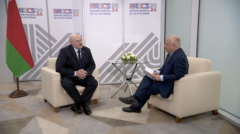There aren’t many world leaders who’ve been in power for 30 years.
Alexander Lukashenko of Belarus has been accused of stealing elections, crushing dissent and dismantling democracy.
The UK, the EU and the US do not recognise him as the legitimate president of Belarus.
There’s something else you should know about him: if there’s any leader who knows Vladimir Putin inside out, it is Lukashenko. The two men have known each other for years and meet regularly.
Alexander Lukashenko met me on the sidelines of the Brics summit of emerging economies. He wants Belarus to become a member.
I asked him to comment on claims that North Korea had sent troops to fight alongside Russia in Ukraine.
“Rubbish,” Lukashenko replied. “Knowing his character Putin would never try to persuade another country to involve its army in Russia’s special operation in Ukraine.”
“And if the reports are confirmed?” I asked.
“It would be a step towards the escalation of the conflict if the armed forces of any country, even Belarus, were on the contact line,” replied Alexander Lukashenko.
“Even if we got involved in the war this would be a path to escalation. Why? Because you, the Anglo-Saxons, would immediately say that another country had got involved on one side… so Nato troops would be deployed to Ukraine.”
I ask him whether Vladimir Putin has ever asked Lukashenko to provide Belarussian troops for the Kremlin’s war in Ukraine.
“Never. Neither he, nor [former Defence Minister] Sergei Shoigu, nor the current Defence Minister Andrei Belousov has ever raised that question.”
But Belarus has played a part in Russia’s war. In February 2022 Russia’s full-scale invasion of Ukraine was launched, partly, from Belarusian territory. Why did the country’s leader allow the Kremlin to do that?
“How do you know I gave permission for Belarusian territory to be used?” Lukashenko asks me.
“Because Belarusian territory was used [for the invasion].”
“There were exercises going on involving several thousand Russian soldiers. Putin started withdrawing these troops from where they were in southern Belarus, down a road, along the border with Ukraine.
“At one point he redirected some of these troops to Kyiv. I’m sure they’d been provoked. It’s up to Putin how he withdraws his troops. Via Kyiv. Or he could have gone through Minsk.”
“Didn’t you call Putin to ask what was going on?” I ask.
“No. He didn’t call me. And I didn’t call him. These are his troops and he has the right to move them out whichever way he likes.”
That comment reflects the degree of influence the Kremlin has in neighbouring Belarus.
Another example: Russia has stationed tactical nuclear weapons in Belarus.
“Is Putin ready to use those weapons in the war in Ukraine?” I ask.
“Putin will never use the weapons stationed in Belarus without the Belarusian president’s consent,” Lukashenko tells me.
“Are you ready to allow the use of nuclear weapons?”
“I’m completely ready, otherwise why have these weapons? But only if the boot of one [foreign] soldier steps into Belarus. We have no plans to attack anyone.”
Human rights groups estimate there are currently 1,300 political prisoners in Belarus.
Alexander Lukashenko had previously told me there were none.
But speaking to me today (perhaps inadvertently) he used the phrase “political prisoner”, when speaking about the small number freed in recent months.
Some commentators have interpreted the releases as a message from Lukashenko to the West that he seeks better relations.
He denies that.
“We freed political prisoners on humanitarian grounds,” he says. “They were mostly elderly people and the sick. That’s all.
“This is no step towards improving relations with you. If you don’t want relations with us, that’s fine. We’ll get by without you.”

